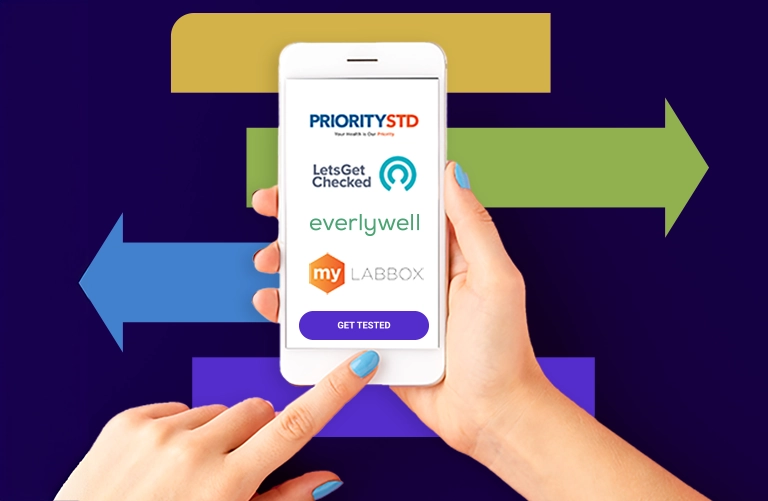Understanding Herpes: Symptoms, Testing & Treatment
Understanding Herpes: Symptoms, Testing & Treatment
Genital herpes is a common STD that can affect anyone who is sexually active. Most people will have no symptoms, or mild symptoms that will go unnoticed or be mistaken for other skin conditions such as pimples or ingrown hairs. Learn more about this STD, what symptoms it may cause, how it can affect the body, testing procedures, and available treatment options.
Get Tested for Herpes
ABOUT HERPES
What Is Herpes And How Does It Affect Your Body?
ABOUT HERPES
What Is Herpes And How Does It Affect Your Body?
Herpes is a viral infection that could be caused by either the herpes simplex virus type 1 (HSV-1) or the herpes simplex virus type 2 (HSV-2). Genital herpes is spread by having vaginal, anal, or oral sex. Those with oral herpes caused by HSV-1 generally got it during childhood or as a young adult from non-sexual contact with infected saliva.
Genital herpes can be spread in a number of ways, including direct contact with:
- A herpes sore
- Saliva from a partner who has an oral herpes infection
- Genital fluids from a partner who has a genital herpes infection
- Skin in the oral area of a partner with oral herpes
- Skin in the genital area of a partner with genital herpes
Most individuals infected with herpes won’t present any symptoms. However, there are some things to look for. Those who have genital herpes, or HSV-2, may experience symptoms such as:
- Pain or itching in the genital area
- Small red bumps or tiny white blisters a few days or weeks after infection
- Ulcers from ruptured, oozing, or bleeding blisters; these may cause painful urination
- Scabs as ulcers heal
Genital herpes sores will appear wherever the infection entered your body. If you touch a sore and then rub or scratch another area, you can spread the infection, even to your eyes. Sores can develop sores on:
- Buttocks and thighs
- Anus
- Mouth
- Urethra
- Vaginal area
- External genitals
- Cervix
- Penis
- Scrotum
While HSV-1 is the main cause of oral herpes that causes cold sores or fever blisters on and around the mouth, it is possible to have genital herpes caused by HSV-1 if contracted during oral sex.
Untreated genital herpes can become severe for those with suppressed immune systems. You also are at higher risk of transmitting the infection to other parts of the body. If you are pregnant, herpes can result in problems for you and the unborn fetus or newborn baby.
Above information source: Mayo Clinic, Genital Herpes Overview and Genital Herpes – CDC
HERPES TESTING INFORMATION
What To Know About Herpes Testing
Testing for genital herpes can use one of two methods. If sores are present, a PCR test can be performed on the cells or fluid or using blood or spinal fluid that would test for the DNA of the herpes virus. This method can provide differentiation between HSV-1 and HSV-2 for proper diagnosis.
If no sores are present, a blood antibody test may be used. Unfortunately, this method of testing may not be as accurate at finding the exact viral cause of the infection. Also, because it’s looking for antibodies, it won’t always be clear if it’s a currently active infection or an infection that occurred in the past. The sample will also need to be taken some time after exposure as it takes weeks for antibodies to develop.
Source: HealthLinkBC, Herpes Test
Test results will be provided anywhere from the same day to a few days after the lab received the sample. This will depend on the type of test performed and the lab being used. Some clinics may offer rapid HSV-2 testing that would provide results in as little as 10 minutes.
Source: HealthLinkBC, Herpes Test and Kaiser Permanente, Herpes Tests
Unfortunately, there is no cure for genital herpes. However, there are prescription viral medications that may help sores heal sooner during an outbreak, lessen the severity and duration of symptoms in recurrent outbreaks, reduce the frequency of recurrence, and minimize the chances of transmitting the virus to others. You may need to take medications daily, or the medication may only be necessary during an outbreak.
The only real way to avoid genital herpes is to abstain from any sexual activity. However, you can lower your chances of contracting the STD by being in a long-term, mutually monogamous relationship with a partner who is negative and properly using condoms every time you have sex.
- Anyone who experiences genital symptoms
- Those who have had sex with a partner with genital herpes
- Those who’s medical provider found signs of possible genital herpes infection
Sources: Mayo Clinic, Genital Herpes Overview, Diagnosis & Treatment and Genital Herpes – CDC